Brittany Howard, With Pride
As the Grammy-winning singer prepares to headline Wolf Trap's Out & About Festival, she takes time for some deep talk.

“I need more Stevie Wonder documentaries,” says Brittany Howard, repeating, as if singing a refrain, “I need more Stevie Wonder biographies. I need more about Stevie Wonder’s life, you know what I’m saying? Because yes, he’s an icon, but still, the younger generation really needs to know more about who Stevie Wonder is and how long he’s been good. He’s been exceptional since he was a child. Some of the stuff he’s doing with his music, to this day, is still ahead of his time. Still! It’s incredible. And it teaches me so much every time I listen to it.”
In case you missed it, the singer with the powerhouse vocal cords, who began her career fronting the Grammy-winning rock band Alabama Shakes and has since moved on to an extraordinary — and Grammy-winning — solo career, is a huge Stevie Wonder fan.
“I’m a diehard Stevie fan,” she grins. “I listened to Songs in the Key of Life just about every day during 2021, because of COVID. So he was definitely giving me some rays of sunshine. He’s one of the best we ever got.”
Howard is headlining this year’s Out & About Festival at Wolf Trap. This is the second year the venue, tucked away in a ravishing, almost magical enclave of woods in Vienna, Virginia, has played host to an assortment of LGBTQ artists and allies to foster Pride, inclusion, and community. Last year’s inaugural event, headlined by Brandi Carlile, was a two-day affair. This year’s festival has compressed into a single Saturday, on June 22, with a roster bursting with artists from all facets of the LGBTQ community.
In addition to Howard, the venue’s multiple stages — including the massive, spectacular Filene Center — will host Jenny Lewis, Lawrence, Okan, Kim Gordon, Tiny Habits, and Alaskan indie sensation Quinn Christopherson.
“I think it’s hugely important,” Howard says of the Out & About Festival. “It can be really difficult as an LGBTQ act going across the country. Sometimes you’re opening for someone who loves you and is in support of you, but maybe their audience isn’t, right? It’s really scary. And you never know what you’re going to get night-to-night.
“So I think it’s huge to have support from [audiences] who can see you and love you for just being a human being, first and foremost. And then actually listen to what you have to say, relate to your experience, and have a connection like that. I think it’s huge.”
The Alabama-born Howard, who in February released her extraordinary sophomore solo album What Now and stars as the titular character in the charming Netflix animated feature Thelma the Unicorn, came out as a lesbian early in her career.
“I think it is impossible for me not to have come out,” she says during a recent Zoom from her home in Nashville. “I wouldn’t be able to live my life. I think it would have been destruction. That’s what I think it would have been.
“How can I be open to create if I’m hiding? If I’m afraid? If I’m worried? If I’m sneaking around? If I’m dodging questions? That’s not how I want to live my life. And if anyone has anything to say about it or doesn’t want to listen to my music because of that, that does not concern me. That is not my business. I’m talking about love. I’m talking about expression. And I’m not catering to what sells. I’m not going to cater to that.”
She takes a breath and concludes, “I would just say that everything I’m doing right now is one-thousand times percent better than any trajectory in which I was going to hide my sexuality.”

METRO WEEKLY: I’d like to begin with your early years. Was music always an integral part of your life growing up?
BRITTANY HOWARD: Music has always been a part of our family. We would do it as entertainment. We would listen to it at barbecues. We would listen to music throughout the house all the time. And I stayed at everybody’s house — I went to my grandmothers’ houses, I went to my aunties’ houses. Everybody had a different taste in music. It’s just always been there.
I remember being really young — I don’t know — maybe my earliest memory was four years old. I remember holding a microphone for the first time and singing into it. And that did something to me. I remember the first song I sang was, “You Ain’t Nothing but a Hound Dog.” And then I sang “Wild Thing.” And I remember looking around the room. And it was my great-uncle — he’s a bluegrass player — it was all these bluegrass dudes. And I remember looking around the room and seeing them all laughing and lit up. And I remember feeling like, “I did that.” I wanted to keep singing all night. But it was bedtime and I had to go to bed. But I do remember that moment being something really electrifying.
MW: It sounds like music was in you from the start.
HOWARD: Oh, yeah. I think I was supposed to do this.
MW: Going into school and high school, did you sing with choirs? Did you train? Did you pursue music?
HOWARD: No. My school was a small school. We didn’t have choir. We had marching band. So I did join the marching band, because I wanted to be near music. I got to learn a lot about arrangement through marching band. Got to meet a lot of kids who also loved music. And I saw a concert that some high school kids were putting on. And it was them playing the instruments and they had bands. I was 11 years old. And I’m in there and I remember watching this band play for the first time. And that was when I decided that I wanted to be in a band. I was 11 years old.
I saw these kids in my school playing their instruments and singing these songs. And I looked at the audience and the audience was just dancing and having fun. And these are my peers. And I was like, “These kids have superpowers when they have instruments. Look how cool they are. And look how powerful they are.” And that’s when I decided I was going to teach myself how to play music.
I’m self-taught in everything that I do. I didn’t have access to teachers or anything like that. So I just taught myself how to play everything. Started writing songs at eleven.
MW: That’s incredible. What do you formally play? What instruments?
HOWARD: Oh, listen. Being someone who is regularly surrounded by musicians, it’s hard to call myself a formal player of anything. But I can write a song on almost anything. You give me an instrument, I’ll figure out how to make a song out of it. I think the one I’m most proficient in is probably guitar. And I’m definitely a bass player. And I’m a drummer. And I can do a little bit on keys. I can work something out.
MW: How did you decide to make music a career? How did you decide, “Okay, this is the path. I’m going to try to make it in this field?”
HOWARD: I didn’t try to make music my field. I just wanted to play music, because in me, the dream had already died. Because I knew that this isn’t something that people are generally successful at. And at the time, when I was young — 18, 19, 20 — I knew that I didn’t have this look that everybody on the TV screens and the magazines had. So I had kind of already just given up on the idea of doing this for a living. I knew that I would always have a day job and then I would have music at night. And I had just kind of resigned myself to that life. I never thought it was going to work out. But it found me. I was doing my thing and it found me. And it blew my mind. It still blows my mind to this day.
MW: You were a postal worker for a while.
HOWARD: That’s right. Mm-hmm.
MW: What was that like?
HOWARD: It was hard work. It was hard work. Sometimes I’d have 12-hour days. You’re just outside all day. You’re delivering that mail. And me, I was a — we call it a rural carrier. So my route would change every day. So I never really got to get used to the routes. It’d take me all day. Be outside. Sometimes you don’t even have time to eat. You trying to stay hydrated. It’s hot. There are tornadoes outside. It was a rough job. It was a hard job.
MW: There were tornadoes?
HOWARD: Oh, yeah, yeah, yeah. I delivered, I think the date was April 15, I can’t remember the year. But it was before the Shakes took off. We had a day where my day started at 4 a.m. And we loaded the trucks full of mail. We knew it was going to be a tornado day. And so our supervisor was like, “The best thing for us to do is to get out there early and to deliver the mail as quickly as possible so you can come back.” Because we do deliver the mail rain or shine. It’s true. And so we’re out there. And then the tornadoes just started just ripping through. This is Madison, Alabama, Huntsville, Alabama. And it was just all-day-long tornadoes. I got stuck in a situation where I had to turn into a stranger’s house, you know? Yeah, it was a wild day.
MW: You were the living embodiment of the movie, Twister.
HOWARD: [Laughs.] Yeah, it was a Twister kind of day, for sure.
MW: I feel bad for our mail carriers now, because they’re not just delivering mail. They’re delivering nearly every Amazon package out there. I tip them every Christmas because they work so hard.
HOWARD: Yeah, I say just leave a little bottle of water. You should get you some plastic bottles, freeze them, put them in the mailbox. Put a little granola bar out there. That helps a lot.
MW: That’s a good idea. I’m going to try that. Eventually, you stopped delivering mail as the Alabama Shakes took off. Music became a full-time gig for you. What ignited that?
HOWARD: So for us, it was just the success of the music. It was taking off quicker than we could get a management team together. It was taking off quicker than we could get the album work done. Taking off quicker than we could finish our album. People were really excited about it.
And so we started doing this tour. We got on this tour with this group, Drive-By Truckers — they’re from North Alabama. And I have a lot of respect for them, just for making it out of Alabama as a band. And so they took us out on tour and our newly found management was like, “Listen, if you really want to do this music thing, you might want to consider quitting your day jobs so that we can actually do this. Because you’re not going to be able to leave for a month from your work, you know?” And I quit pretty much immediately. I couldn’t wait to quit my job. And that’s really how it started. It just was like it’s not practical to have a day job anymore.
MW: How old were you at the time when the Shakes took off?
HOWARD: I was 22 or 23.
MW: Were you ready for that success?
HOWARD: Oh, I mean, yeah. Yeah, I was definitely ready. It was like all my dreams were coming true. I was ready to work. I was ready to play the show every night. I was ready to see the world. I had all the energy I could possibly need.
MW: Most of us lead lives where we’re not in front of an audience singing our hearts out. Thinking back to the early years, especially, what was that like for you to feel the response from the audience.
HOWARD: For me, it’s the energy exchange. It’s the connection. I think when I was younger, I didn’t fully understand what it was. But now that I’m older and I can look back, it was definitely connection. I was a young woman who had never been anywhere. I was from a small town in the South. I had never been outside of the South. And I was very open-minded, you know? I was excited to meet all different types of walks of life.
I had never seen a real mountain before. I had never seen the desert before. And now, all of a sudden, I’m getting to see the world and I’m getting to meet all the different types of people across the world. And I think that connection, for me, really built my self-esteem and helped give me life, you know what I mean? It was giving me the opportunity to be who I really was.
MW: And you guys exploded. I’m the furthest thing in the world from being a music expert, but would you say there’s an Alabama sound? Is there an Alabama style?
HOWARD: No. I don’t think so. The South is definitely…. People have always tried to write about the South forever since it’s been around. It’s very hard to describe the South. It’s just something else. It really is. I don’t think it’s able to be replicated, truly. You can replicate it. We had The Rolling Stones. And Rolling Stones are amazing. Led Zeppelin was trying to replicate Southern music. It’s amazing. They did put their own little take on it, right? But down here, the things we talk about, the struggle we talk about, and just even the sweat we sweat, it’s just different.
So I’m sure my music is informed just by the way my mouth is shaped. The way I speak is informed by Alabama, you know? Now, is there an Alabama sound? I don’t know if I could coin that or put that into a format.
MW: Speaking of the South, so many of the attacks on our community right now are coming from the South, the rights that they’re taking away. As someone who’s clearly proud of her roots and of the South, does this behavior surprise you or disappoint you? How do you feel about it?
HOWARD: Oh, of course, I’m not surprised. And of course, I’m horrified by it. I’m also galvanized by it. This is something that I grew up in. Ever since I grew up here, there’s always been this element of, “You shouldn’t be here.” You know what I mean? Because I’m mixed-race. So it’s like from the time I was born, I’ve been put up against somebody that just doesn’t like me for existing. And then also being out — and proudly out — and also someone who is on a stage and in the media, speaking about our rights here in the South, well, there are lots of people that don’t like me here.
But also, just because they decide this is what they want the South to be, don’t make it true. I’m Southern. This is my home. My family’s been here since the beginning. My family’s been in Athens, Alabama for, I don’t know, 200 years. Same area.
So what makes this person say, “Well, this is the South and this is how it should be” any more than I should have a say? I think that’s crazy. This is my home. And this is my South. And these people, in my opinion — it started off with religion and it ended up just being, what’s the word I want to use? It ended up being kind of like a cult of personality thing around here. And so Jimmy Bob’s going to do whatever Tommy Bob’s doing. And they are mindless between the two of them. Because they don’t know what they’re talking about. And a lot of people, they don’t like anything different. But that’s them. And that’s a component of the South. And those people get in government, because they do have religious ties and they do have access to a lot of parishioners who will vote for them. And that’s the South. That’s how it works. We’ve got a church on every corner.
However, in my community, there’s lots of gays, LGBTQIA people. There’s lots of people out here who are protecting each other, who are going to encourage people to vote, who are going to rallies for these people who are just fighting against this ignorance. In the South, there are so many people who are fighting for progress and change. It’s almost like we can identify the problem and raise the problem on a platform, but why don’t we raise the people who are doing something about it on a platform as well? And get them people in front of the media? But we’re out here fighting like we’ve always done.
MW: There’s a lot of fight there. Part of it’s politics. Part of it’s control of the court. The Supreme Court just approved of gerrymandering — I think it was in a Georgia case, that they said, “Well, it’s okay to be political,” but they struck down the fact that it was racial. Which is ridiculous. So it disenfranchises the Black vote in this region of Georgia.
HOWARD: That’s right.
MW: And how do you fight that? You can’t fight that. Well, you can fight it, but it makes it harder to fight it.
HOWARD: Oh, it makes it real hard. Yes, you’re absolutely right. I mean, one thing that we have is igniting the youth around here. The young people around here. We have social media. There’s so many ways that you can get people involved in voting. Yes, there is gerrymandering, but it’s also just educate.
Because of what’s happening, there is an opportunity to educate people about why this is happening, how it happened, and the history of how it’s been happening, right? And we’ve just had the same thing happen here in Nashville, where our entire district got gerrymandered. So now it’s this small blue area has now been broken up into, I think, like, six different pieces in these larger rural areas.
So what does that mean for our votes? And what does that mean for the rest of us? Educating each other, especially in the gay community, is the answer. You shouldn’t stick your head in the sand, and it’s why we should go vote. It’s not time to give up. This isn’t the time to say, “Well, this place is on fire, let’s move out.” Because you understand why? This is my home. If everybody runs away, what’s it going to turn into, you know?
MW: I appreciate you taking that detour. I do want to turn our attention to your new album, What Now. That album is a luxury. Listening to that album is like taking a journey through almost every genre possible, which is inexplicable, because you are not sticking to one thing with it. It’s just gorgeous. I don’t have the language for this — I’m not a music writer. But I listened to it several times and I just think it’s an astonishing album. One of the things that occurred to me, and I didn’t notice this until about three or four tracks in, was that the tracks were connecting with these, what do you call them?
HOWARD: Sound bowls. Yeah.
MW: I gradually realized you were threading the tracks together in a linear form. Can you talk about the decision to do that?
HOWARD: Sure. Well, one of the first thoughts that I had was, I don’t know — it was several years ago, where I was like, “It would be interesting to input some sort of frequency of healing into music.” And doing it kind of subliminally so people don’t really quite know that they’re receiving anything beneficial. They think they’re just listening to music and enjoying that, but really it might have some sort of actual, holistic effect in helping them get through their day or lowering their stress levels. And so for a few years I was kind of toying like, “Yeah, that would be cool. That would be a cool thing to try to do.” I’m sure it’s been done before.
And then later, when I was making this album, I had all these songs that felt disjointed, right? I was like, “I don’t know how to make these connect cohesively. And then I thought like, “Oh, the sound bowls would be cool.” It would act as a palate cleanser between the tracks and it would also act as connective tissue. This is what connects this whole experience, you know?
I think of the album as an experience. You’re sitting down and you’re spending time with me, and my psyche, and getting to know me and my ins and outs, and the heartbreaks and triumphs, and all those things. So, in a way, the sound bowl is just kind of like my medicine, too, because it’s something that I started getting into about five years ago — going to the center here in town and getting sound baths. And it was so nice.
One of the teachers there taught me about how the brain is always searching for a frequency to match. And so the sound bowls can be this really nice frequency, raising the frequency of your brain, because your brain’s meeting that. And it’s so nice. And I had them come out and record those sound bowls just for this album.
MW: What is a sound bath?
HOWARD: A sound bath can be a lot of different elements. But in this case, it was these crystal singing bowls. And you get all of these different frequencies hitting your body and it causes relaxation. It’s very meditative. Usually, you’re laying on a mat, you’re super comfortable, and you might have a blanket over you. And then there’s an orchestrator who’s up there playing the sound bowls. And it’s a really beautiful experience. Very relaxing.
MW: So, are these interstitials between the cuts are also meant to calm and heal us?
HOWARD: That would be nice. That would be nice if that works, right? But it’s also like a sorbet. It cleanses that song you just heard off of you. It gives you just long enough to be cleared to take in a different view, a different song, a different landscape.
MW: I can see that. It’s interesting, though, because I saw it more as the connective. I started to see it as part of a narrative. For me, it became the narrative of what you were trying to put across. And I would like to specifically ask you, what is the message you’re trying to get across with What Now?
HOWARD: I don’t think there is a great message. I think music is meant to be interpreted. I think sometimes music is meant to be a mirror to what you’re going through, what you need at the time. For me, I’m just telling my story, where I am at, at this moment, place, and time, and what it feels like, and therefore what it sounds like. I don’t think there is one general message.
MW: Would you like to hear my interpretation?
HOWARD: I’d love to.
MW: My interpretation is that the album is a prayer for healing the world, for healing our inner turmoil. But also for healing global turmoil, climate turmoil, all turmoil. I felt like the overall message was one of hope, peace, and sort of a prayer for the world. That’s my interpretation.
HOWARD: I think that’s beautiful. I think that’s beautiful. As for me, I mean, I feel like I do have a song that is like a prayer on this album. To me, it’s “Another Day.” That was kind of like a part of me that was indulging in my idealism, you know? Wouldn’t it be nice if we could all take a look at ourselves so that we can have more compassion for each other? So that we could hear each other? So we could connect with each other? So don’t keep blowing each other up because we don’t understand? Or we’re so greedy and so fear-based we keep hoarding resources so this other group can’t have it? It’s just kind of childish and archaic.
And in that song “Another Day,” I was just saying like, “I believe we can get to a place where we can love ourselves enough to love each other,” you know? I’d say I’m a hopeful person. I’m a realist, but I’m hopeful. I believe in us.
MW: There’s one interesting choice you make at the very end. The singing bowls go away. The second to last cut is a hard cut into the final cut. What was the thinking behind that choice?
HOWARD: It was purposeful. Throughout the album, you’re getting comfortable with hearing the sound bowls come back. And there’s something that happens when you’re looking forward to them. You’re like, “Oh, here come the sound bowls. I’ve grown to like these.” You know? And so now that you’ve gotten nice and comfortable, then we don’t provide you with that anymore. And it’s kind of jarring. It’s like, “Ah!” And we’re into another song. And it’s making you kind of go like, “Oh, did it skip? Was there a problem?” No. We just took away the comfort. And now you feel what it feels like to be in this song and be in this world. That last song is about depression, or better yet, recognizing your depression’s coming in and you’re kind of helpless to it, and now you’re in it.
And that’s what depression feels like. It feels like the rug got ripped up from under you. And it was just to, I don’t know, try to viscerally put someone in my shoes. And then having the song end on kind of a question mark. Nothing got wrapped up tidily and there was no positive messaging like, “Oh, but it’s all going to be okay.” No. It’s like, “You don’t know that.” And that’s what it feels like. And then the album starts all over again. And my design was for the album to start over. And now you can experience my words and my feelings through a different lens. Because it’s like, you’re getting the kind of rainbow of emotions that I can access.
MW: It’s masterfully done. When I was growing up, you’d get an album, you put the album on, and you play it track to track, flip the album, play it track to track. All the way through. And then maybe you went back and listened and wore out some tracks. But you couldn’t just put the song on repeat or easily skip around. Nowadays, with Spotify or any streaming music service, really, you can cherry-pick. “Oh, I want to listen to this, this, this, and this.” And it occurred to me that What Now flies in the face of that. I mean, you can listen to songs that you want to revisit, but you don’t get the impact and the beauty of the album if you don’t listen from start to finish. That is the journey of the album.
HOWARD: Yes.
MW: It feels like you saying, “I’m going to buck the trend here You’re going to listen to it my way.”
HOWARD: I’ll say this much. Ever since I was able to step a foot in this industry, one thing that was always important to me was to be an artist first, to create what I need to create to express myself. This is what I’m here for. This is my gift. And to protect it at all costs. And there’s costs. There’s definitely costs to being an artist.
I don’t know if Spotify was designed — well, I’ll take that back, I do know. Spotify, they’re commoditizing music, right? So they’re making money off of it. It wasn’t made for artists. And therefore, yes, you can cherry-pick anything you want to. Put it on a playlist. It’s out of order. I don’t know how much investment people need to put into artists, you know what I’m saying? There’s so many artists to pick from. How many people nowadays can just invest in a single person’s body of work, I don’t know.
I guess all I’m trying to say is, I’m just going to keep doing what I’m doing, despite the fact that we have a culture of people just putting out singles or things like that. Which totally makes sense. I get it. Especially — I’m going to take a tangent for a second — especially in this industry. Because, as musicians, it’s kind of harder to make a living than ever, and it has to do with a lot of things. COVID, obviously, had something to do with it. But also streaming. Inflation. Tour buses costing an arm and a leg. Crew costing a lot of money. It’s just an expensive career. We’re all playing pony polo right now. And at the end of the day, and I’ve always said this, and I’m going to say it again, and I’m going to say it until I die: Do music first, be an artist first.
I think if you’re an artist and you’re really being authentic, at the end of the day there will be people who want to support what you do and connect with what you do. And I’m just going to keep on doing that. So yes, this album is a full album, made to sit down and listen to. And I will keep making those. And that’s that.
Brittany Howard headlines Wolf Trap’s Out & About Festival on Saturday, June 22. Tickets range from $49 to $89. Wolf Trap is located 1551 Trap Road in Vienna, Va. Visit www.wolftrap.org.
What Now is available on all streaming platforms and for sale wherever you purchase music. Visit www.brittanyhoward.com.
Thelma the Unicorn is streaming exclusively on Netflix. Visit www.netflix.com.
Follow Brittany Howard on Twitter at @blkfootwhtfoot and on Instagram at @blkfootwhtfoot.
Support Metro Weekly’s Journalism
These are challenging times for news organizations. And yet it’s crucial we stay active and provide vital resources and information to both our local readers and the world. So won’t you please take a moment and consider supporting Metro Weekly with a membership? For as little as $5 a month, you can help ensure Metro Weekly magazine and MetroWeekly.com remain free, viable resources as we provide the best, most diverse, culturally-resonant LGBTQ coverage in both the D.C. region and around the world. Memberships come with exclusive perks and discounts, your own personal digital delivery of each week’s magazine (and an archive), access to our Member's Lounge when it launches this fall, and exclusive members-only items like Metro Weekly Membership Mugs and Tote Bags! Check out all our membership levels here and please join us today!








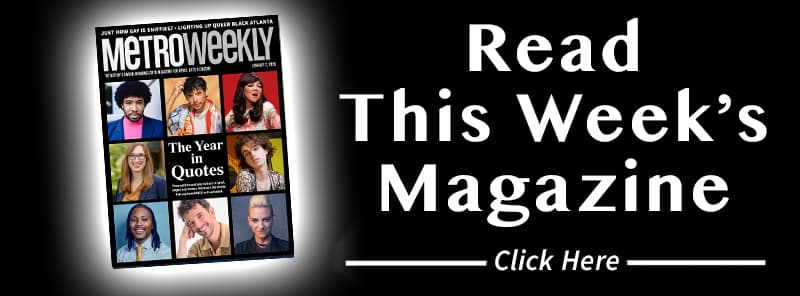


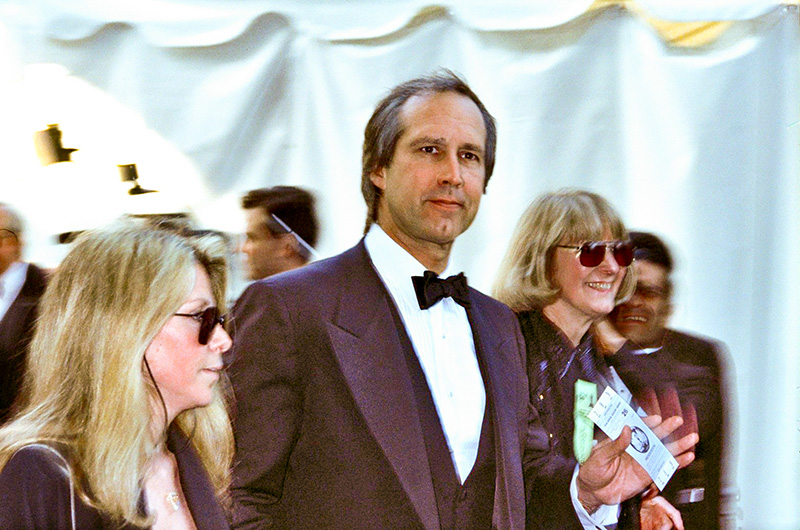












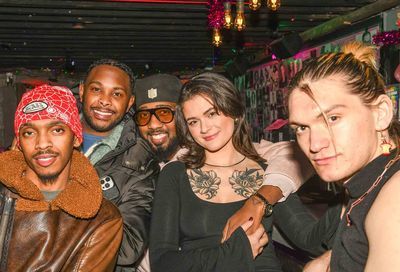
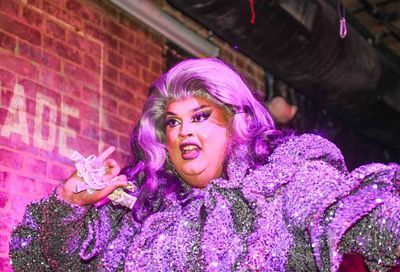
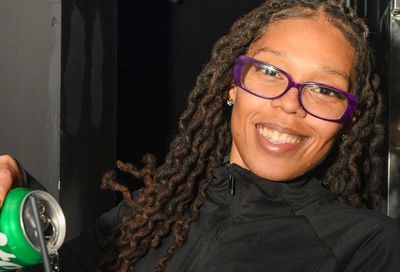
You must be logged in to post a comment.